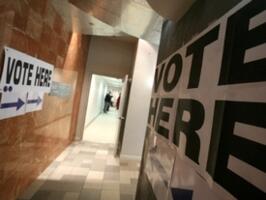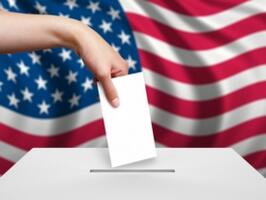78% Favor Proof of Citizenship Before Being Allowed to Vote
A federal judge last week upheld the right of states to require proof of citizenship before allowing someone to register to vote. Voters continue to overwhelmingly support such a requirement.
A new Rasmussen Reports national telephone survey finds that 78% of Likely U.S. Voters believe everyone should be required to prove his or her citizenship before being allowed to register to vote. That’s up from 71% a year ago. Just 19% oppose that requirement. (To see survey question wording, click here.)
Twenty-nine percent (29%) believe laws that require proof of citizenship before allowing voter registration discriminate against such voters. But more than twice as many (61%) say such laws do not discriminate, up three points from 58% who felt that way in March of last year. Ten percent (10%) are undecided.
Opponents of proof-of-citizenship laws claim they are intended to keep eligible voters from voting, while supporters say instead that they are intended to keep ineligible voters from casting votes. Thirty-four percent (34%) think it is more common that people are prevented from voting who should be allowed to vote. Half (50%) of voters disagree and think that more often people are allowed to vote who are not eligible to vote. Seventeen percent (17%) are not sure.
This marks a six-point increase from last year in the number of voters who think it is more common for people to be allowed to vote who are not eligible. It’s also the highest level of doubt about the voting process in surveys since January 2008.
The federal judge’s ruling last week upheld laws enacted in Arizona and Kansas because federal voter registration forms do not include a proof of citizenship requirement. Thirty-eight percent (38%) of voters believe state governments should set the requirements for voter registration, but 51% think that is a responsibility of the federal government. Eleven percent (11%) are not sure. This is unchanged from earlier surveying.
(Want a free daily e-mail update ? If it's in the news, it's in our polls). Rasmussen Reports updates are also available on Twitter or Facebook.
The survey of 1,000 Likely Voters was conducted on March 20-21, 2013 by Rasmussen Reports. The margin of sampling error is +/- 3 percentage points with a 95% level of confidence. Field work for all Rasmussen Reports surveys is conducted by Pulse Opinion Research, LLC. See methodology.
In surveys since June 2006, voters have been just as adamant in their support of laws that require voters to prove their identity at the polls before being allowed to vote. Fifty-nine percent (59%) do not believe photo ID laws discriminate against some voters.
Most voters across the partisan spectrum support laws that require proof of citizenship before being allowed to register to vote, although Democrats are less enthusiastic about those laws than Republicans and unaffiliated voters are. Seventy-seven percent (77%) of GOP voters and 67% of unaffiliateds believe such laws do not discriminate against some voters, but Democrats are evenly divided on that question.
But then 54% of voters in President Obama’s party think it is more common for legitimate voters to be denied the right to vote, while 74% of Republicans and 51% of unaffiliated voters think that it’s more common for non-voters to vote.
Ninety-five percent (95%) of voters who think illegal voting is more common support proof-of-citizenship laws. Those who think it is more likely that eligible voters are denied their right to vote are evenly divided over such laws.
Sixty-nine percent (69%) of all voters say they have been following news reports about voter registration at least somewhat closely, with 34% who are following Very Closely. Voters 40 and over are much more interested in the topic than those who are younger.
Only 17% think it is too hard to vote in the United States. Twenty-seven percent (27%) think it's too easy to vote in America today.
Forty-one percent (41%) of all voters think American elections are fair to voters, well below the all-time high of 57% who felt that way in October 2012.
Americans strongly value being a citizen of the United States, but one-in-four thinks it's too easy these days for someone to become a citizen.
Additional information from this survey and a full demographic breakdown are available to Platinum Members only.
Please sign up for the Rasmussen Reports daily e-mail update (it’s free) or follow us on Twitter or Facebook. Let us keep you up to date with the latest public opinion news.
The survey of 1,000 Likely Voters was conducted on March 20-21, 2013 by Rasmussen Reports. The margin of sampling error is +/- 3 percentage points with a 95% level of confidence. Field work for all Rasmussen Reports surveys is conducted by Pulse Opinion Research, LLC. See methodology.
Rasmussen Reports is a media company specializing in the collection, publication and distribution of public opinion information.
We conduct public opinion polls on a variety of topics to inform our audience on events in the news and other topics of interest. To ensure editorial control and independence, we pay for the polls ourselves and generate revenue through the sale of subscriptions, sponsorships, and advertising. Nightly polling on politics, business and lifestyle topics provides the content to update the Rasmussen Reports web site many times each day. If it's in the news, it's in our polls. Additionally, the data drives a daily update newsletter and various media outlets across the country.
Some information, including the Rasmussen Reports daily Presidential Tracking Poll and commentaries are available for free to the general public. Subscriptions are available for $4.95 a month or 34.95 a year that provide subscribers with exclusive access to more than 20 stories per week on upcoming elections, consumer confidence, and issues that affect us all. For those who are really into the numbers, Platinum Members can review demographic crosstabs and a full history of our data.
To learn more about our methodology, click here.





